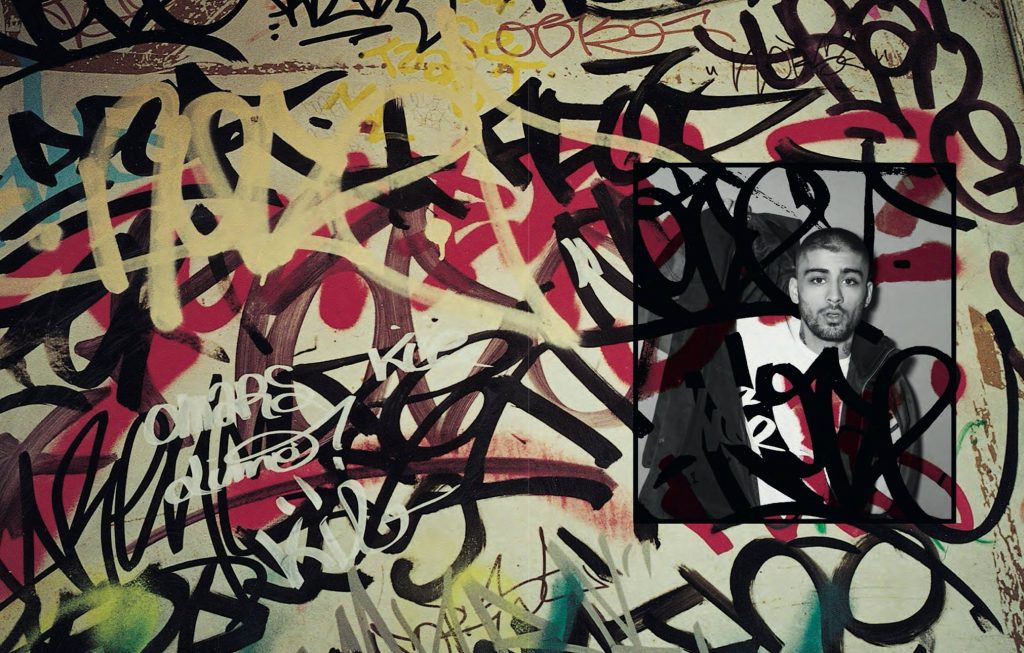
by Lakshmi Gandhi & Asha Sundararaman
The following post was originally published via tinyletter.com/thelakshmiandashashow and republished here with permission.
Since bursting onto the scene as a teenager member of One Direction, Zayn Malik has constantly been in the public eye, particularly in his native Britain. The son of a Pakistani father and British mother, Zayn stunned many fans earlier this year when he canceled several concerts because he was suffering from severe anxiety.
In his new book, Zayn goes into why he opened up about his anxiety and revealed he also suffered from disordered eating throughout his early career.
Lakshmi: Asha, that was a lot of major revelations! Especially for the singer who was pegged as the “suave bad boy” of One Direction.
Asha: It really was. These are hard enough for the general public to talk about let alone some from a South Asian background and a celebrity.
Lakshmi: When I was writing for Metro New York, I was known as the Zayn expert in the newsroom. Part of this was because I genuinely like boy bands! But I also have to admit that the mercenary part of me also realized that anything about Zayn leads to major clicks. People (many of whom are presumably young women and girls) love reading about him!
Asha: It’s because he’s adorable and was objectively the most attractive member of 1D.
Lakshmi: So adorable! And he really was the most talented one in the group, in my opinion.
Asha: Part of it also was probably also because he’s “exotic” though.
Lakshmi: Well, One Direction was created when all of the members were individual contestants on the British X Factor. Simon Cowell was the one who said the five of them should be a band.
Asha: Oh right, I think I knew that.
Lakshmi: And Simon is shrewd enough to know that a British band needs a hot South Asian Muslim kid! Especially given the demographics in the UK and all that.
Also, “Without Zayn Malik, One Direction become four goofy white guys shouting,” also remains the greatest headline ever written about Zayn leaving the band.
Asha: Best headline ever! He’s definitely the least goofy of them all.
Lakshmi: And I think that was the problem (and also the problem that a lot of child stars have). He wanted to move in a more mature direction, but his boy band fan base wasn’t ready.
Asha: It must be so hard to transition to an adult star once your fan base is teens.
Lakshmi: He often hints at that. This is from that AP profile of him:
He longed to sing songs in a different style and write his own lyrics. “What you’ve got to understand is that none of us really had much say in the music,” he writes. And the Simon Cowell approved style is straight up pop (i.e. Spice Girls.)
Asha: Oh yeah, definitely as a boy band that makes sense, especially one created by Simon Cowell.
Lakshmi: Have you read Mara Wilson’s book? I haven’t yet, but I’ve seen excerpts that deal with how film producers didn’t know what to do as she approached puberty and how they make her do things like wear a chest binder so she’d still look like a child. I was thinking about that when I read about Zayn’s struggles with eating. He dances around it a bit but says he might have had an eating disorder.
Asha: He said he “forgot to eat” in that interview with the AP.
“I realized that I wasn’t eating as much just down to the amount of work that we were doing … our schedule was kind of crazy so we were all over the place,” he said in an interview.
Lakshmi: Here’s another quote, this time from his book:
“When I look back at the images of myself from around November 2014, before the final tour, I can see how ill I was,” the 23-year-old writes in the book, calling it an ‘eating disorder.’
If you have teens/young adults in a band and you are a huge company managing them, not having them eat is VERY BAD.
Asha: THIS right there. How does an entire team not notice that one of their stars isn’t eating? Unless they didn’t really want him to eat…
Lakshmi: Well, one thing that is true about eating disorders is that people who have them often get very good at hiding things and making everything seem “normal.” It’s part of the tricks your mind plays on you.
Asha: True.
Lakshmi: And I think Zayn is particularly courageous to open up about this aspect of his past because he was cast as the ‘bad boy.’ Bad boys in the teen pop star world don’t often show vulnerability, especially when it comes to mental health.
Asha: Yep, super important.
Lakshmi: The post I wrote about Zayn opening up about his anxiety was one of the most read and shared things I did this year. Here’s what he said just after he pulled out of a performance:
“Unfortunately, my anxiety that has haunted me throughout the last few months has gotten the better of me,” part of the statement reads. “With the magnitude of the event, I have suffered the worst anxiety of my career. I cannot apologise enough…”
I felt so bad that he felt the need to apologize to his fans because he was struggling through something.
Asha: He probably feels like he let them down because he couldn’t go on stage.
Lakshmi: Definitely (and I know we’ve all had moments like that on a smaller scale). But I think like Zayn a lot of people go through this thing where they tell themselves, “I can’t take the time to take care of myself, people need me!” And that often makes the problem worse.
Asha: Yep, they have schedules and commitments. There’s no time to take a sick day or a mental health day without something falling apart.
Lakshmi: It’s also worse for child stars. People mocked Britney Spears and Lindsay Lohan when they were at their lowest points, but both of them were supporting their families from a very, very young age. They probably realized they were on their own (and unprotected) decades before they should have.
Asha: Yeah, kids really shouldn’t be supporting their families, especially not in an industry like the entertainment industry.
Lakshmi: Definitely not. Let’s talk about how Zayn’s South Asianness plays into the discussion about his anxiety issues.
Asha: Most South Asians I know say the same thing: the South Asian community doesn’t talk about mental illness. You’re supposed to deal with it silently and it’s just not acknowledged at all. I know that’s the way it was in my family until a few years ago.
Lakshmi: I actually practiced telling people that I have anxiety issues (and randomly drop the fact that I see a therapist into conversations like I did during one of our recent chats!) I started doing this because I realized how much I had internalized the stigma. Once you say you can’t talk about something, it makes it 100 percent worse.
Asha: I think it’s also easier to do that in a place like NYC where it felt like everybody had a therapist (at least in my opinion) rather than a random part of the UK or the US, or anywhere in India/Pakistan
Lakshmi: Yes definitely. I’m typing this from a Starbucks across the street from my therapist’s office, which is in a very exclusive part of Park Slope. So it’s definitely a privilege to have access to this (but if you have access and need to go, please go! And if you don’t have access, know that many clinics have sliding scales and might be able to work with you to find a therapist, particularly if you live near a university with a social work or medical school.)
Asha: I also wonder if it’s a community thing dating back to when your family unit was your entire social life so there was nothing else to do but swallow it.
Lakshmi: Zayn himself seemed to realize how toxic it was to swallow those feelings in this excerpt from the book:
“I’m gonna tell them the truth,” I said. “I don’t want to say I’m sick. I want to tell people what’s going on, and I’m not gonna be ashamed of what’s happening.”
He was lucky because his management was supportive!
Asha: So lucky! Hopefully, that means the industry’s changing.
Lakshmi: And because his fans are so protective of him, it seems like he inspired many of them to speak up about their anxiety and depression issues as well. But what I found in the wake of my cancellation at Wembley wasn’t hate but a massive amount of support from fans—people who understood, kids who were in the exact same situation as I was. Guys on Twitter were telling me how anxiety had affected their lives and saying that they were glad I had spoken up. It felt as though some good had come from the situation.
Asha: Such a heartening response!
Lakshmi: I also think that leaving the band and doing his own thing (and the amount of control that gave him) was really empowering. He probably wouldn’t have made a statement like that if he was still in 1D.
Asha: That’s probably completely true.
Lakshmi: It’s also interesting that Zayn really started delving into South Asian/Pakistani things after he split.
Asha: True.
Lakshmi: Did you read that article I sent you about why he put an Urdu song on his debut album ?
Asha: I did! It was great. He probably has more freedom to explore that part of his identity now that he’s not in 1D because when them he was expected to be exotic but not too exotic.
Lakshmi: Yup! And it’s important to remember that Zayn is in his early 20s, which is when a lot of us start exploring identity issues.
Asha: Also true!
Lakshmi: This part in particular, when he talks about how the song came to be, was very relatable:
“I was telling Malay about my relationship with him and how important it was for me to do well for him, to earn his approval. My dad’s a hard worker and he has strong values. He was a personal trainer and is solidly built, and he used to go on at me all the time about being a good student and getting the right education. He wanted the best for me, and I wanted to please him in return…. I wanted to show him, as much as everyone else, that I could do it.”
Asha: We all have the need to prove something to our parents.
Lakshmi: Yes, reading between the lines, you could also see why it might be hard to talk about anxiety with his family. I think especially if your family grew up poor and you didn’t (and Zayn is obviously very well off now!) so it makes it hard to talk about mental health too. Like, yes, people who date supermodels can also suffer from anxiety. But that is somehow hard for people to understand.
Asha: Because they tie happiness to wealth when it’s so much more than that.
Lakshmi: Then there’s the immigrant thing, ‘I came here for you, why can’t you get out of bed?’
Asha: Oh my god, yes.
Lakshmi: And that line of thinking helps no one!
Asha: One day we’ll have to talk about the second generation thing and the difference between growing up as in the majority and growing up as a minority.
Lakshmi: Yes! When I was writing that post about Zayn canceling his concerts, I found a piece from the BBC that quoted a health expert about British South Asians. South Asians “don’t want mental problems in the family to be exposed. They want to hide it, to preserve the family image and status.”
Asha: And make their kids marriageable.
Lakshmi: But also, does anyone really care if you are in the US or the UK? I think it’s more about what we internalize that what reality is like.
Asha: Even my white mother sometimes comments on how she’s surprised my (Indian) cousin’s wife married him given his mental health issues. Some people definitely care.
Lakshmi: But those people should be avoided, as they sound unpleasant!
Asha: Also, I believe there’s evidence to suggest that stress triggers some mental health issues, especially in men. And being a black or brown man in the West is certainly stressful.
Lakshmi: Yes, there has been a lot written lately about how dealing with racism can lead to PTSD.
Asha: It’s certainly been my anecdotal experience.
Lakshmi: It’s being studied more in recent years. I think especially for young black and brown men who grew up during stop and frisk or other events that make you feel like your very existence makes you a criminal those things are hard!
Asha: Seriously. And I think repressing your identity is also hard, in different ways.
Lakshmi: To go back to Zayn, being a boy band member is basically the equivalent of constantly playing a character. So if you suppress who you really are, it takes a toll (and tabloids deliberately don’t understand that and mock you when you act out). You know what book you should read? “The Love Song of Jonny Valentine.” I loved it! It’s a YA about a precocious middle schooler who is a musical prodigy and becomes famous and (inevitably) corrupted. It’s secretly about Justin Bieber, but the author will never admit it.
Asha: Ooo, I’ll check it out. I’m reading a super dense food history book that I might give up for a while.
Lakshmi: Jonny Valentine is interesting because it came out in 2013, so before Bieber really began worrying people (and then made his comeback with his latest album.) But the way it’s written, you can see why child stars are often doomed to fail.
Asha: Well, I for one hope Zayn doesn’t fail.
Lakshmi: Honestly, I think that he will be fine. He’s getting treatment. He is talking about his issues. He is getting to explore his identity at a younger age many other child stars get to. Those are all encouraging signs.
Asha: Maybe we’re slowly changing the way we treat our child stars.
Lakshmi: Also, I think the fact that Zayn is exploring Urdu poetry and music is encouraging. I don’t speak Urdu but I know I’m not the only one who finds the sound of Urdu music incredibly inspiring and soothing.
Asha: It’s beautiful.
Lakshmi: Yes! And I think it’s fitting to end this week on the English translation of Zayn’s song “Flower.” Here’s how he translates the lyrics for fans in his book:
“By the way, here’s the translation of the lyrics: ‘Until the flower of this love has blossomed / This heart won’t be at peace / Give me your heart….'”
Isn’t that perfect?
Asha: So perfect.
 Lakshmi Gandhi is a journalist and pop culture writer based in New York. Her work has appeared in Metro New York, NBC Asian America and NPR’s Code Switch blog, among other sites. She likes it when readers tweet her @LakshmiGandhi with their thoughts on Asian American issues and romance novels.
Lakshmi Gandhi is a journalist and pop culture writer based in New York. Her work has appeared in Metro New York, NBC Asian America and NPR’s Code Switch blog, among other sites. She likes it when readers tweet her @LakshmiGandhi with their thoughts on Asian American issues and romance novels.
 Asha Sundararaman is a freelance writer and photographer based in Oakland, California. When she’s not discussing pop culture, she can be found in her kitchen blending the flavors of her Southern and Indian roots.
Asha Sundararaman is a freelance writer and photographer based in Oakland, California. When she’s not discussing pop culture, she can be found in her kitchen blending the flavors of her Southern and Indian roots.




